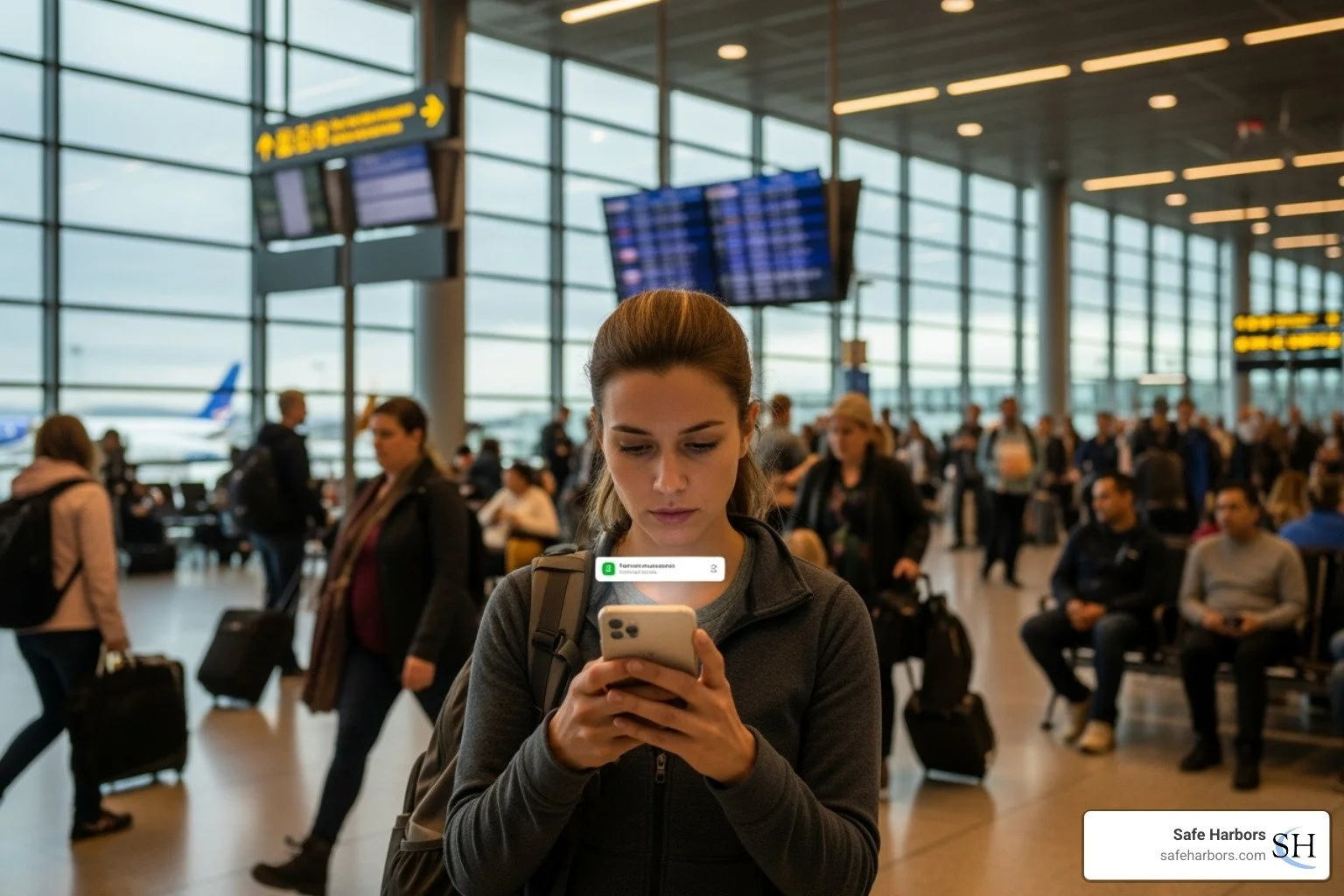Why Optimizing Business Travel Spend is Critical
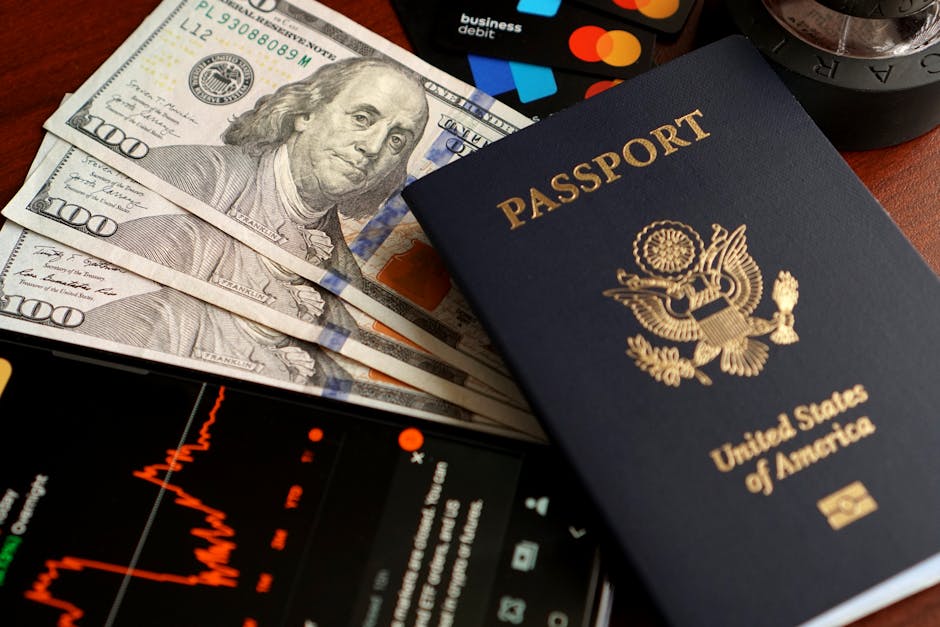
Here are key strategies to optimize your business travel costs:
- Implement a Clear Policy: Set expectations for bookings and expenses.
- Book in Advance: Secure lower rates, especially for flights.
- Leverage Technology: Use platforms for booking, tracking, and compliance.
- Negotiate & Consolidate: Get better deals with preferred vendors.
- Encourage Smart Choices: Promote cost-conscious employee behavior.
- Analyze Data: Use insights to identify savings and improve programs.
To successfully optimize business travel spend, companies must adopt a strategic approach. It's not just about cutting costs; it's about maximizing value. With global business travel spending expected to hit $1.48 trillion by the end of 2024, smart management is more crucial than ever.
Business travel is critical for growth. As 88% of travel decision-makers agree, face-to-face interactions drive organizational success. This playbook will guide you in turning travel expenses into strategic investments.
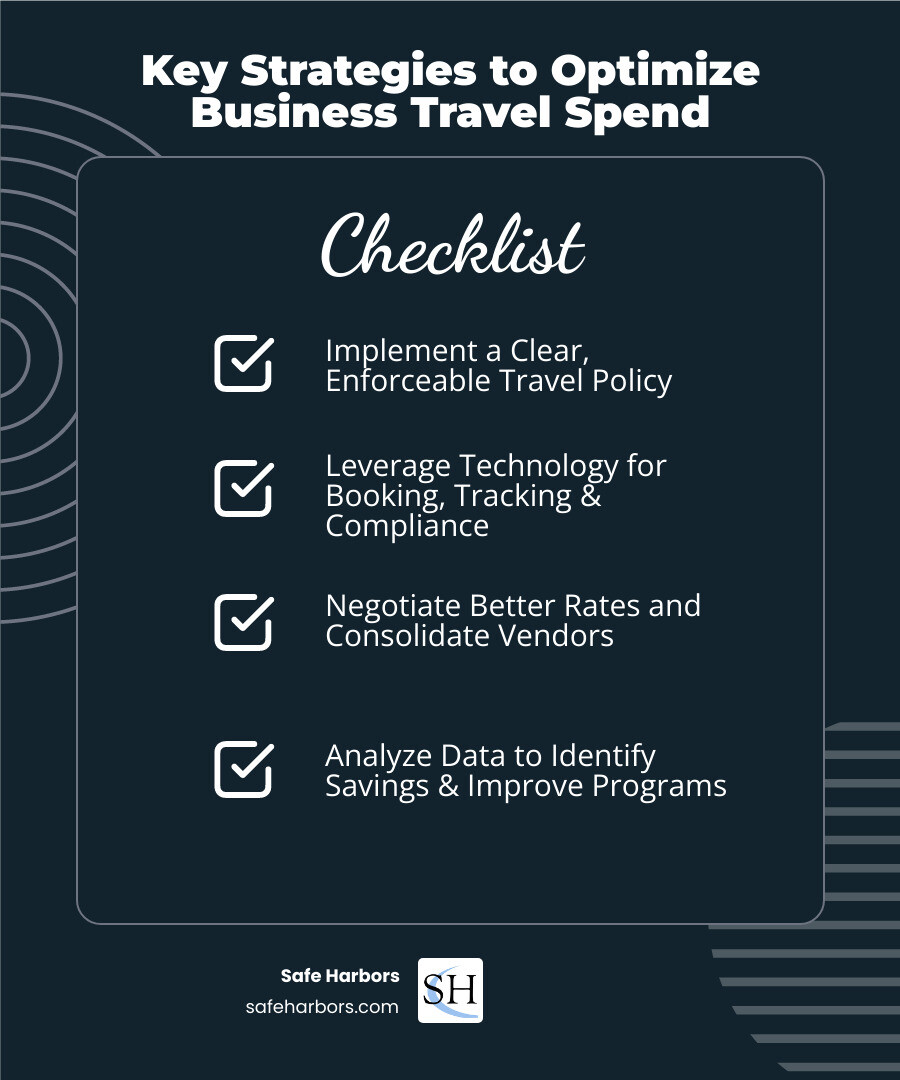
Laying the Foundation: Strategic Budgeting and Policy Development

To optimize business travel spend, you need a solid foundation. This means understanding where your travel dollars are going, planning how to allocate them, and setting clear guidelines. For CFO and Finance Executives, this groundwork is essential. Every business trip should deliver real value, and that starts with smart data gathering, identifying cost categories, and allocating funds strategically. Your travel policy is the cornerstone that holds it all together.
Understanding and Budgeting for Primary Travel Costs
To truly optimize business travel spend, you must account for every cost. The main categories include:
- Transportation: This is usually the biggest budget item. It includes airfare, which varies by booking time and class, as well as ancillary fees for baggage and seat selection. It also covers ground transport like taxis, ride-shares, rental cars, and trains, plus parking and tolls.
- Accommodation: Hotel rates fluctuate based on location, season, and quality. Negotiating corporate rates and using extended-stay options for longer trips are key strategies.
- Meals and Entertainment: This covers food and relationship-building activities. Many companies use per diems (a fixed daily allowance) to simplify budgeting and reporting. Client entertainment includes business dinners and events that help strengthen partnerships.
- Miscellaneous Expenses: Don't overlook smaller costs that add up. These include visa and passport fees for international travel, travel insurance, communication costs like roaming charges, and conference or event fees.
Choosing the Right Budgeting Approach
Picking the right budgeting approach helps you optimize business travel spend. There's no one-size-fits-all solution, but understanding your options is key.
- Hard Cap Budgets: Set strict, predefined limits (e.g., $150/night for hotels). They offer control and predictability but can be inflexible. Best for companies with standardized travel.
- Dynamic Budgeting: Adjusts based on real-time market rates and trip purpose, using technology to balance savings and traveler experience. Our tech partnerships at Safe Harbors support this flexibility.
- Trip-Based Budgets: Allocate a specific amount for each journey. This aligns with ROI but requires more setup time, ideal for project-based businesses.
- Departmental Budgets: Give each department a lump sum for travel, fostering accountability. This works well for larger companies with mature departments.
Most companies use a hybrid approach, combining hard caps for routine expenses with dynamic adjustments for high-value trips.
Crafting a Corporate Travel Policy That Works
A well-crafted travel policy is the backbone of spend optimization. It's a guide that empowers employees to make smart, cost-conscious decisions. Recent data shows that nearly half of companies are tightening their policies to simplify choices and control costs.
Your policy should define:
- Booking Procedures: How, where, and when to book, including preferred channels like Safe Harbors' online tools and advance booking requirements.
- Preferred Vendors: A list of chosen airlines, hotels, and car rental companies to leverage collective buying power for better rates.
- Expense Guidelines: Clear limits for lodging, meals, and transport, and a defined reimbursement process.
- Approval Workflows: Who needs to approve trips and expenses to maintain oversight.
The goal is to avoid confusion, reduce non-compliant spending, and ensure everyone understands expectations. We help companies craft policies that are effective and easy to follow, minimizing friction and maximizing compliance.
How to Optimize Business Travel Spend with Proactive Cost Control
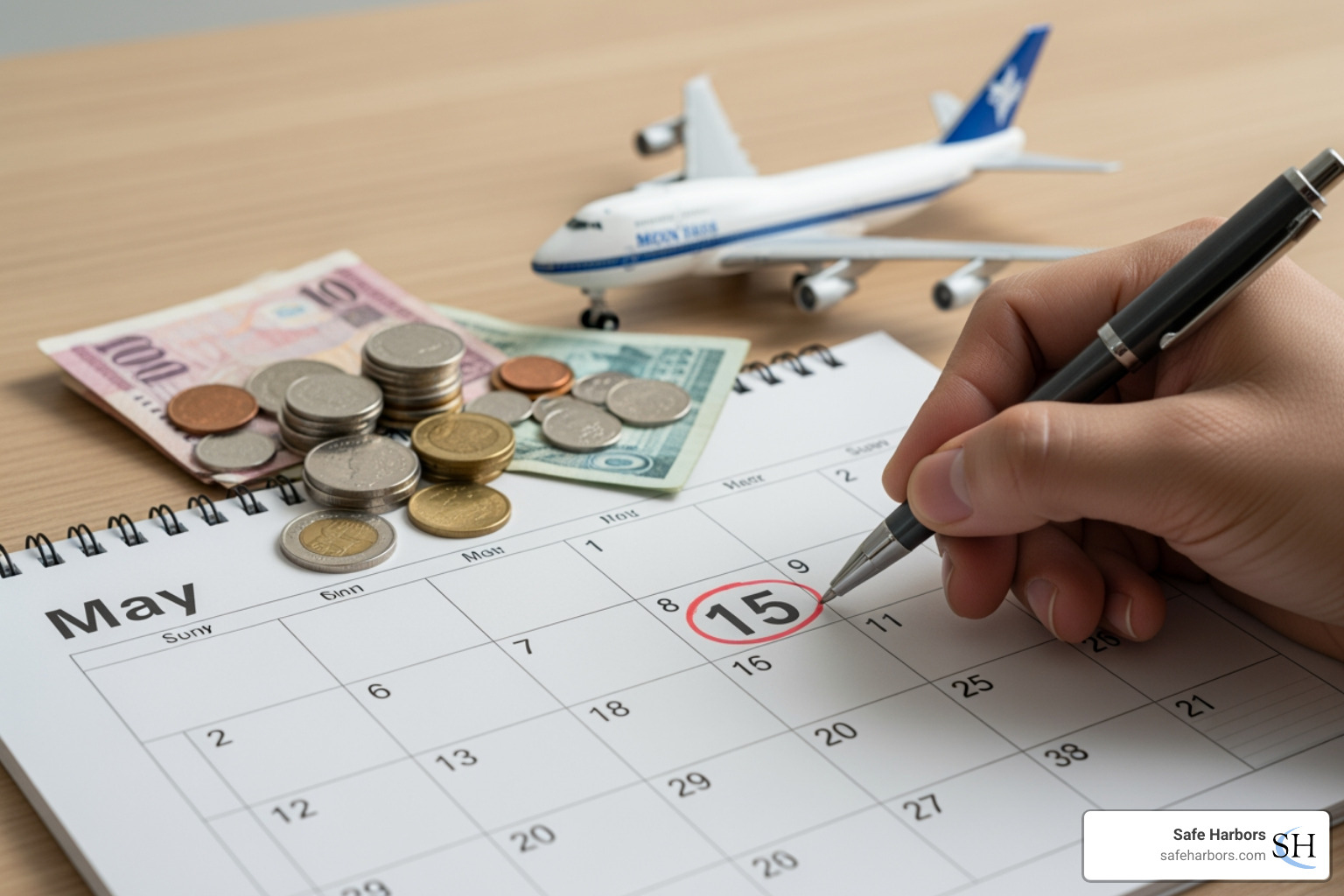
With a solid foundation, it's time to shift from planning to action. The biggest impact on your travel budget happens before a trip begins. By implementing smart strategies that prevent overspending, you can proactively optimize business travel spend.
Pre-Trip Strategies for Maximum Savings
The early booker gets the savings—and they can be substantial.
Advanced booking is one of the most powerful cost-control tools. Industry data shows that booking domestic flights at least 28 days before departure can save up to 24% compared to last-minute fares. For international flights, the sweet spot is around 60 days out, yielding about 10% savings. Our booking tools are designed to encourage these early bookings, helping your team capture these savings.
When trip dates are flexible, off-peak travel is another smart play. Mid-week flights are almost always cheaper, and avoiding major holidays or local events can drastically reduce accommodation costs. Sometimes shifting a trip by just a day or two can make a huge difference.
There's also great value in consolidating trips. Can multiple meetings be combined into one journey? Strategically planning itineraries reduces the number of individual trips, saving on airfare, hotels, and ground transport.
Of course, always start by evaluating trip necessity. While business travel is critical for growth, not every trip is equal. Sometimes a high-quality video conference can accomplish the same goals at a fraction of the cost. Promoting virtual meeting alternatives for non-critical interactions can significantly reduce travel frequency while maintaining strong connections.
Negotiating Better Rates and Leveraging Loyalty Programs
Smart negotiation and strategic use of loyalty programs can dramatically reduce business travel expenses. This is where an experienced travel management partner pays off.
First, consolidate vendors. By focusing your bookings with a select few preferred airlines, hotels, and car rental companies, you create negotiating power. With that consolidated spend, we can negotiate corporate rates that individual companies can't achieve alone. As a global travel management company, Safe Harbors brings significant buying power to the table. Our relationships with vendors worldwide mean we can secure exclusive rates that translate directly to your bottom line. In fact, leveraging a TMC's global buying power can reduce your travel spend by 5% to 50%.
Airline and hotel loyalty programs also offer value. Corporate programs and accumulated status can lead to perks like upgrades, lounge access, and free baggage, which improve the traveler experience while reducing incidental costs. Benefits like discounted rates, room upgrades, and free nights can be used for future business travel, directly impacting your budget.
When you work with us, you gain a strategic partner who knows how to maximize every dollar of your travel spend. We help you steer these programs and capture every available benefit.
Leveraging Technology and Data for Smarter Spending

Trying to optimize business travel spend without technology is like navigating with a paper map in the GPS era. Modern travel and expense platforms, automation, and data analytics have changed the game, providing real-time visibility, enforcing compliance, and surfacing powerful insights. These tools deliver 5 more benefits of corporate travel management that directly impact your bottom line.
Leveraging Data Analytics to Optimize Business Travel Spend
Data transforms guesswork into strategy. By analyzing travel spending patterns, we can make smarter decisions and continuously optimize business travel spend.
This starts with tracking Key Performance Indicators (KPIs) like average cost per trip, policy compliance rates, and spend by department. But raw numbers aren't enough. We analyze spending patterns to understand the "why" behind the costs. For example, do some departments book last-minute more often? Reviewing spending patterns regularly helps improve T&E policy compliance and opens up savings opportunities. Benchmarking against industry standards provides context, while predictive analytics helps forecast future demand and pricing trends, allowing for better supplier negotiations.
Our platforms provide detailed reporting that transforms raw data into actionable strategies, making insights accessible to everyone.
The Benefits of Integrated Travel Management Platforms
Integrated platforms are the command center for booking, policy, expenses, and reporting. This integration is essential to optimize business travel spend.
Centralized booking ensures employees access your negotiated rates and preferred vendors in one place, giving managers full visibility. The real power is real-time policy enforcement. The platform embeds your policy into the booking flow, flagging out-of-policy options before a purchase is made. This gently guides employees toward compliant choices. Companies using integrated T&E platforms see a 26% increase in policy compliance and 21% annual cost savings.
Automated expense reporting eliminates manual data entry. Platforms capture receipts, match them to transactions, and route reports for approval automatically, saving hours and reducing errors. This increased compliance and cost savings help skyrocket corporate productivity with a TMC.
At Safe Harbors, we leverage elite tech partnerships to provide flexible booking tools that are intuitive for travelers and powerful for administrators, giving you control without the headaches.
Best Practices to Optimize Business Travel Spend Post-Trip
The trip may be over, but the work isn't. Post-trip processes are critical for controlling expenses and uncovering future savings.
- Streamlined Expense Reporting: Encourage immediate submission via mobile apps. The easier the process, the higher the compliance.
- Automated Reconciliation: Platforms can automatically match expenses to corporate card transactions, saving finance teams hours of manual work.
- Timely Reimbursements: Prompt payments make employees feel valued and motivated to comply with policies.
- Fraud Detection: Integrated platforms can flag unusual spending, duplicate receipts, or suspicious expenses. With organizations losing about 5% of revenue to occupational fraud each year, this is essential.
- Trip ROI Analysis: Look beyond expenses to understand the value a trip created. Did it lead to a signed contract? This helps justify future travel budgets.
By managing these post-trip processes, you close the loop on spend optimization, turning travel from a cost center into a strategic advantage.
Balancing Cost, Compliance, and Traveler Well-being
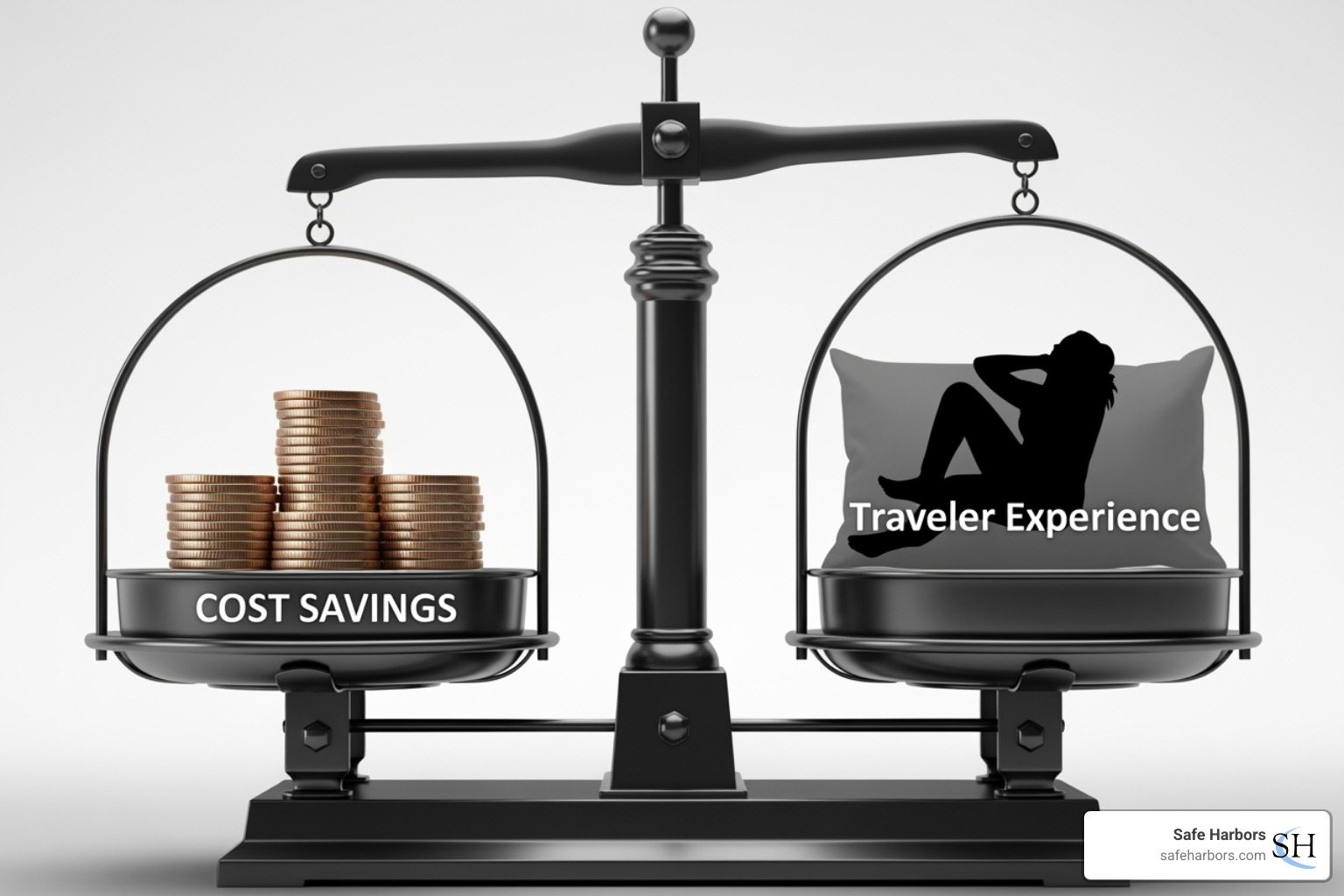
Successfully optimizing business travel spend isn't just about slashing costs. It's about finding the sweet spot where financial responsibility, policy compliance, and employee well-being coexist. Pushing too hard on one side harms the others. Aggressive cost-cutting leads to unhappy travelers, while ignoring compliance causes spending to spiral. This balancing act is complex, but it's where the real magic happens.
Encouraging Cost-Conscious Behavior Without Sacrificing Morale
We need employees to be smart about spending without feeling micromanaged. This is the business travel manager's dilemma: keeping finance and your travelers happy. The secret is creating a culture of understanding.
Clear communication about why policies exist turns a restrictive rulebook into a shared goal. Training and education on booking tools and expense guidelines empower employees to make informed, in-policy decisions. Some companies also find success with incentivizing compliance through small rewards, recognition, or even gamification.
Overly strict policies create traveler friction, leading to lost productivity and employee dissatisfaction. A sobering reality is that a majority of business travelers admit to deviating from company policies, telling us that policies alone aren't enough. We need user-friendly booking tools and responsive support to create an environment where travelers feel supported, not policed. At Safe Harbors, our flexible tools and fast support are designed to reduce this friction and improve compliance naturally.
Emerging Trends Impacting Corporate Travel Budgets
The corporate travel world is always evolving. Staying ahead of these shifts is essential to optimize business travel spend.
- Sustainability: Environmental impact now plays a major role. In fact, 61% of travel decision-makers said their organization encourages travelers to book sustainable options. Policies are shifting to favor rail over short-haul flights, and many travelers would even decline a trip if sustainable options aren't available. Our platforms help track carbon emissions and guide travelers toward greener choices.
- Bleisure Travel: The line between business and leisure has blurred. As leisure travelers are taking longer vacations compared to pre-Covid trends, employees are extending business trips for personal time. Smart companies are creating "bleisure" policies that allow this flexibility while clearly defining which expenses are covered.
- Duty of Care Technology: Employee safety is a non-negotiable obligation. With 58% of employees admitting they've changed travel plans due to safety concerns, advanced duty of care technology is crucial. It allows for real-time traveler tracking, risk alerts, and emergency support. Our concierge management with duty of care ensures every traveler is looked after 24/7.
- Dynamic Pricing Pressure: Suppliers use algorithms that change rates constantly. 50% of travel managers say they're seeing significant pricing pressure, making it harder to predict costs. A dedicated partner with the right technology can monitor these fluctuations and secure the best available prices.
Frequently Asked Questions about Optimizing Travel Spend
How can a small business start optimizing its travel spend?
Even small businesses can make a real difference in their travel spend without complex systems.
- Start with a simple travel policy. Outline the basics: how to book, spending limits for hotels and meals, and preferred vendors. Clarity drives compliance.
- Encourage booking in advance. This single habit can save thousands. According to industry reports, booking flights 28 days in advance can save up to 24%. Make it a standard practice.
- Use a dedicated business credit card. This simplifies expense tracking and often comes with travel rewards that can offset future costs.
- Track everything. You can't improve what you don't measure. Even a simple spreadsheet will reveal patterns and insights that lead to smarter spending.
What is the single most effective way to reduce business travel costs?
While there's no magic bullet, one strategy consistently delivers the biggest impact: implementing and enforcing a mandatory advanced booking policy.
This is powerful because it directly tackles your largest expenses—airfare and hotels—where timing dramatically affects price. A flight booked weeks out can cost half as much as one booked days before departure. An advanced booking policy is straightforward to implement and enforce through booking systems, paying immediate dividends. Our data-driven insights can help you pinpoint the optimal booking windows for your most frequent routes to maximize savings.
How does Safe Harbors help optimize spend?
Think of Safe Harbors as your expert partner, bringing three powerful advantages to optimize business travel spend.
First, we provide access to our global network of negotiated rates. Through our buying power and industry relationships, we secure prices that are often significantly lower than what's publicly available.
Second, our technology makes everything easier. Our flexible booking tools guide employees to compliant options naturally. Our automated expense management system reduces time spent on receipts and paperwork. Policy enforcement happens seamlessly, without policing your team.
Third, you get our people. Our expert team offers concierge management and proactive guidance, analyzing your data to identify savings opportunities. With our best response speed and comprehensive white-glove service, including duty of care, your travelers are supported 24/7.
The bottom line? Companies working with us see measurable reductions in travel spend while improving the traveler experience.
Conclusion
Optimizing business travel spend isn't about penny-pinching; it's about investing smartly in your business's growth while running an efficient, compliant, and humane travel program. By building a solid foundation with clear policies, using proactive cost controls, and leveraging technology, you can transform travel from a cost center into a strategic asset.
However, the corporate travel landscape is constantly shifting. Sustainability, bleisure travel, and dynamic pricing are reshaping the industry. Navigating these changes while controlling costs and keeping travelers happy requires agility and expertise.
This is where the right partner makes all the difference. At Safe Harbors, we live and breathe this. Our best response speed means you're never left hanging. Our flexible booking tools, powered by elite tech partnerships, make compliance easy. And our comprehensive white-glove service—including concierge management with duty of care—ensures your travelers are supported every step of the way.
You're not just getting a vendor; you're gaining a dedicated partner invested in your success. We're committed to helping you continuously improve your travel program.
Ready to transform how your company approaches business travel? Partner with an expert in Business Travel Services and find what's possible when you have the right team in your corner.




